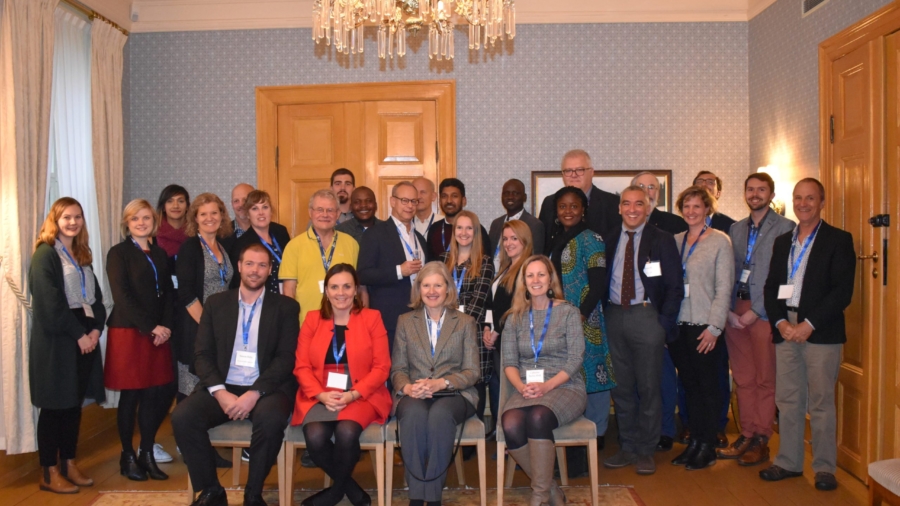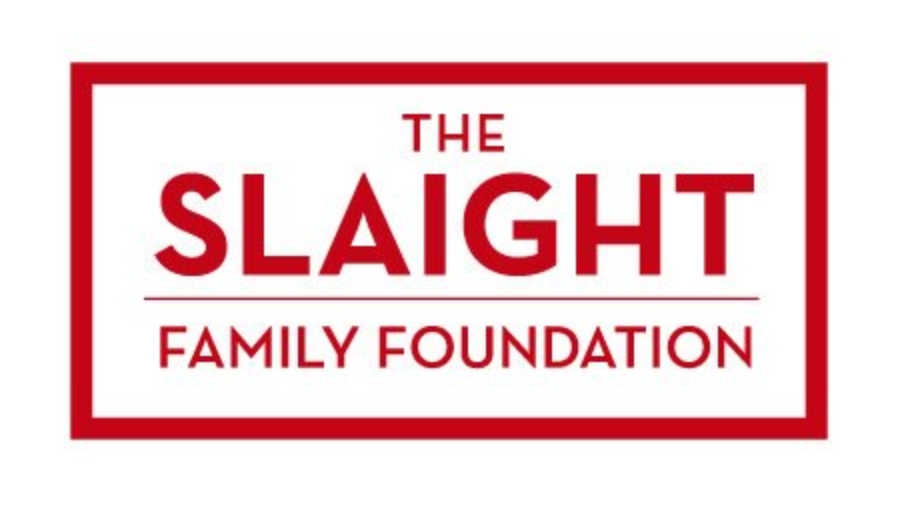TORONTO (MARCH 3, 2023) – To mark International Women’s Day, The Slaight Family Foundation is donating $15 million to 15 international organizations working to improve human rights and opportunities for women and girls.
The recipient organizations – working mainly in impoverished, fragile or conflict-affected areas – each focus on different issues facing women and girls, including human rights abuses, child marriages, sex trafficking, legal support, HIV and AIDS and education.
“The aim of this gift is to improve conditions for women and girls living in difficult circumstances, who represent some of the world’s most vulnerable populations,” said Gary Slaight of The Slaight Family Foundation. “The projects we are funding will leverage the expertise of these vital organizations to protect women and girls in the most fragile countries from direct harm, rebuild the lives of those who have been unjustly affected by conflict, deprivation and disease and give them the tools and support they need to survive and thrive.”
“This investment in international NGOs is unprecedented and the projects being supported will directly assist more than one million women and girls in some of the world’s most fragile regions,” said Dr. Samantha Nutt, President of War Child Canada. “It’s such an important time to be highlighting this issue. For The Slaight Family Foundation to recognize the threats faced by women and girls, and acknowledge that their concerns matter with such an historic gift, is a profound message to send. On behalf of the entire group we extend our sincerest gratitude to The Slaight Family Foundation for their incredible support of our collective work.”
Since 2013, The Slaight Family Foundation has funded several strategic initiatives to multiple organizations. These initiatives started with gifts to five Toronto hospitals to support priority healthcare issues, followed by programs to address global humanitarianism, healthy development of children and youth across Canada, support for Indigenous issues and, last year, a seniors’ initiative to help keep seniors in their homes and communities, including the Allan Slaight Seniors’ Fund at the United Way Greater Toronto.
Project Information
AIDS-Free World
Sub-Saharan African countries with UN peacekeeping missions and high rates of HIV in women
Develop and roll out a smartphone app to tap young women’s unique knowledge of and solutions to living under the threat of sexual violence. Women in remote areas who answer open-ended, recorded questions orally, in private, as easily as leaving a voicemail message, will be transformed from victims with lived experiences to experts helping to end sexual violence against women.
Canadian Feed the Children
Ethiopia
Creation of a new ‘Livelihood & Gender Equality Fund’ championing the human rights of girls and women in Ethiopia. We will focus on reducing the forced migration of girls and women by helping them finish their education and improve future prospects including starting new, sustainable businesses through an agribusiness hub to develop female entrepreneurship. The initiative includes a sexual and reproductive health and rights campaign, strengthening community police, legal and healthcare systems, and a new research study on child migration.
Canadian Red Cross
South Sudan/Central Africa Republic
The Canadian Red Cross is launching an innovative program that brings health solutions directly into crisis and conflict areas, reaching women and girls who are cut off from health facilities due to violence. Essential health care and supplies delivered by local Red Cross responders will increase safe pregnancies, improve nutrition, and provide access to clean water and lifesaving treatments for disease.
CARE Canada
Somalia
Innovate and improve menstrual hygiene management for school-age girls with female genital mutilation – develop and test new solutions with established women and girls’ groups, train women to produce hygiene products locally, improve school sanitation facilities and increase community awareness.
Crossroads International
Senegal
The program will increase access to gender-responsive heath services and launch a youth-led awareness campaign for sexual and reproductive health rights among adolescent girls and boys at risk of child trafficking, forced prostitution, child labour and sexual violence in Kedougou, Senegal.
Human Rights Watch
Middle East/N Africa
End discrimination of women and girls by documenting the abuses of male guardianship system in the Middle East and North Africa. Year 1 will focus on documenting male guardianship in Qatar; how lack of domestic violence legislation and discriminatory laws leaves women exposed to domestic violence in Kuwait; and the start of mapping how and where male guardianship exists in the region.
Partners In Health Canada
Malawi & Sierra Leone
Improved access to sexual and reproductive health services especially for adolescents, strengthened care for survivors of sexual and gender-based violence, and increased availability of high-quality obstetric care. Activities include health worker training, resourcing and delivery of clinical care, educational initiatives for young people, and community-based work to raise awareness about women’s and girls’ rights and promote health seeking behaviour.
Right To Play
Mozambique
Transform the lives of more than 50,000 girls across Mozambique through a gender-responsive education program that removes barriers to access, builds teacher capacity, and positively impacts national programs and policies. The result will be higher literacy rates, lower drop-out rates, and a generation of girls who are better supported to succeed.
Roméo Dallaire Child Soldiers Initiative
Helping reduce child soldier recruitment and conflict-based sexual violence through capacity building of national military and police forces, with a focus on female force members; enhance the Dallaire Initiative’s cadre of female international trainers and global champions; raise awareness amongst the global community on the critical role of women in preventing the recruitment and use of child soldiers.
Save the Children
Sierra Leone
Improve knowledge and skills of adolescent girls and boys to be aware of and exercise their rights around sexual and reproductive health and gender equality, to be able to make their own informed decisions related to marriage and pregnancy. This action will transform harmful practices and attitudes that reinforce gender inequalities and gender-based violence and strengthen the institutional and policy environment to prevent child early and forced marriage.
Stephen Lewis Foundation
Sub-Saharan Africa
Expand holistic programmes that address gender inequalities to improve access to HIV prevention services, and support treatment adherence for women and girls living with HIV. Expand the global grandmothers movement through Grandmother Gatherings. Empower grandmothers caring for children orphaned by AIDS to claim their human rights and lead their communities, through peer support, healthcare, skills training, economic empowerment and advocacy.
UNICEF Canada
Somalia
In Somalia, only 30 per cent of children attend primary school with girls accounting for less than half of the total enrollment. This project will focus on girls and children with disabilities to improve their access to early childhood education (ECE) services. Community based and alternative ECE programs will be established in rural areas and provide appropriate curriculum that caters to the children’s different needs. It will also include education for parents and communities so that they can better support their children’s education.
War Child
Afghanistan/Uganda/Congo/Iraq/Syria/Yemen
Empower women and girls to seek justice and tackle impunity within their communities by providing critical legal support for those affected by or at risk of gender-based violence; through targeted educational programming, ensure that girls can uphold their rights, have greater self-determination, and move out of poverty over the long-term.
WE Charity
Sierra Leone (Kono District)
Focus on advancing the rights of vulnerable women and girls by empowering them with the tools, support and skills to bring an end to inter-generational cycles of poverty and injustice. The three-part program will implement training to address human rights abuses and threats affecting them. Part one will deliver community-wide training to create greater awareness about women’s rights and human rights abuses. Part two will provide vulnerable women and girls education on their rights, referral support and life skills to increase their opportunities. Part three will offer the highest-risk women and girls vocational training and accelerated learning opportunities.
World Vision
Mali
Implement the DREAM program - Dedicated to Reducing Early Marriage in Mali - to address the root cause of child marriage; will include sexual and reproductive health services, education and economic livelihood training; upgrading schools with girls washrooms, training parents, teachers, and faith leaders on the consequences of child marriage; train mothers and girls in financial literacy, life skills and income generating activities to increase household income.
For more information:
Jeri Brown, Media Profile
[email protected]
Office: 416-342-1834 Mobile: 416-455-7188



